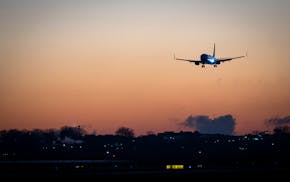Shoppers waiting for the right deal to upgrade their laptop or smartphone will not want to wait past the holidays: New tariffs on products from China and other countries would mean higher prices at retailers like Best Buy next year.
President-elect Donald Trump on Monday vowed to raise tariffs on China another 10% and add 25% tariffs to goods imported from Mexico and Canada. Those tariffs would in many cases be passed on to consumers, reversing a years-long drop in the average cost of consumer electronics.
"There are very, very small margins in this industry, which means the vast majority of that tariff will probably be passed on to the consumer as a price increase," Best Buy CEO Corie Barry said Tuesday. "These are goods that people need, and higher prices are not helpful."
Barry said about 60% of Best Buy's inventory, by cost, is imported from China or relies on Chinese parts; Mexico is the second largest exporter of Best Buy's products.
The added pressure comes at a time Best Buy can least afford it.
The Richfield-based retailer is struggling to increase sales and missed profit expectations for the first time in two years in the quarter that ended in October. Election uncertainty, economic malaise and deal-hungry shoppers made for weak demand and a disappointing third quarter for the electronics chain.
The retailer reported a $273 million profit for the quarter that ended in October, which amounted to $1.26 per share. Although an improvement from last year, analysts were expecting $1.30 per share.
While Best Buy's revenue has been consistently falling, the company had exceeded earnings expectations for nine consecutive quarters.
The company saw comparable sales drop 2.9% this fall, and revenue of $9.4 billion also missed estimates. Best Buy lowered its financial outlook for the rest of the year.
As a result, the company's shares fell 5% on Tuesday to close at $88.48.
Wedbush analyst Seth Basham ranked Best Buy as facing the highest risk of damage from new tariffs among all retailers.
"Electronics costs would increase materially," Basham wrote. "Best Buy did a good job navigating prior rounds of Chinese tariffs — suffering moderate gross margin pressure and a slowdown in comps in 2019 — but the level of proposed tariffs and more precarious financial position of consumers makes the company more vulnerable this time."
Barry said the company will look at "mitigation strategies," but she doesn't expect layoffs or store closures as a result of tariffs. Instead the company will focus on stocking up where it's appropriate and reviewing product assortments.
"What are the promotional and pricing strategies that we could put into place? How much more sourcing changes can be made?" Barry said. "We'll work through everything we can to make this right for our consumers."
Like other retailers, Best Buy has been amping up holiday sales especially early this year since Black Friday is later than normal. Customers appear to be responding well, with same-store sales up 5% in the first few weeks of November.
"As holiday sales have begun and the election is behind us, we have seen customer demand increase again," Barry said in a prepared statement Tuesday. She added in a call with media that "we can definitely see customers responding to those holiday sales."
Despite the strong start, revenue is expected to fall 3% or remain the same as last year's holiday quarter due in part to steep discounts.
Chief Financial Officer Matt Bilunas said there are "potential low points between sales events" that will slow the momentum, and Barry stressed that shoppers are drawn to sales and promotions more than ever to balance budgets after years of inflation.
Even flat sales growth would give Best Buy its best quarterly sales result since 2021.
With the election past and the economy humming along, Best Buy hopes to capitalize on some pent-up demand for phone, tablet and laptop upgrades. Analysts predict the retailer is due to benefit from the start of a new upgrade cycle, and surveys show Black Friday shoppers will be shopping for themselves more than others.
"It's not that everyone's going to run out and buy an AI-enabled laptop, but they may want to come in store, they may want to experience it," Barry said. "They then may want to look for different options from there that might hit their price points better."
Yet if tariffs increase prices substantially, consumers may hold off on their upgrades a little longer.

Bushel Boy, Minnesota's local tomato grower, sold
After 60 years, federal cuts shutting down Job Corps center in St. Paul

In a first, Minnesota doctors walk their own picket line, then hustle to see patients
It's harder to find a job this year, especially a corporate position

